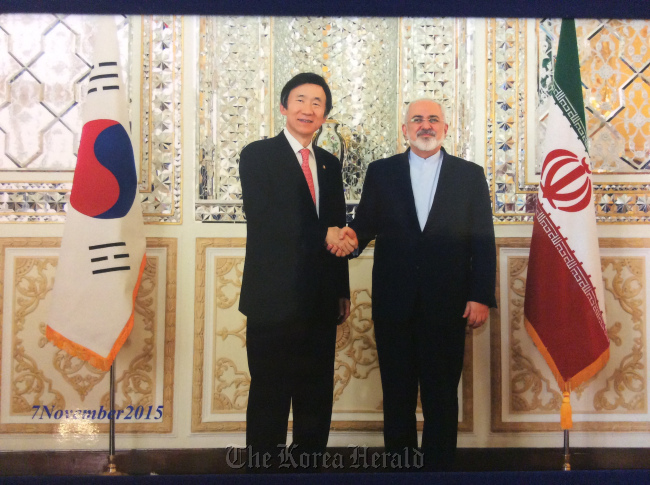Foreign Minister Yun Byung-se set foot in Tehran on Saturday as Seoul’s first top diplomat in about 14 years, meeting with top officials and urging North Korea once again to follow its path to forsake nuclear weapons and regain international confidence.
Yun’s trip comes after that of former minister Han Seung-soo in 2001 and three previous rounds of bilateral talks with his Iranian counterpart Mohammad Javad Zarif on the sidelines of international conferences over the past year. The ministerial meeting took place for the first time in nearly six years in September 2014 in New York.
Yun was the latest in a string of high-flying officials from around the globe to travel to the Islamic republic since it reached a historic agreement last July on sharply curbing its nuclear activities with the so-called P5 1 world powers ― the U.S. China, Russia, the U.K., France and Germany.
The two officials concurred that the breakthrough is bringing about a “crucial turning point” in bilateral ties, with international sanctions set to be lifted to pave the way for South Korean companies’ investments especially in energy and infrastructure. They also agreed to expand high-level meetings and other formal back-to-back talks to step up cooperation in nonconventional areas including health, culture, tourism, development and academic exchanges.
 |
|
Foreign Minister Yun Byung-se (left) and his Iranian counterpart Mohammad Javad Zarif shakes hands at their talks in Tehran on Saturday. (Foreign Ministry) |
While acknowledging the differences between North Korea and Iran, such as in political and economic circumstances, Yun stressed the significance of “tenacious dialogue and negotiations” that made possible what he called a “pivotal landmark” in reinforcing the global nonproliferation regime.
“During the ministerial talks, Yun expressed hopes that the Iranian accord will have a positive impact on tackling the North Korea nuclear issues, and North Korea will take lessons from the negotiation process that helped Iran restore trust from the international community,” Seoul’s Foreign Ministry said in a statement.
“Zarif, for his part, reiterated Tehran’s stance against North Korea’s nuclear program, saying that nuclear weapons will never improve its security, and the recent agreement marks a good example that any sensitive problem can be resolved peacefully through diplomacy.”
The two diplomats also assessed the “complex, multilayered” crises unfolding across the Middle East, with Yun calling for Iran to play a “constructive” role in fighting challenges stemming from Syria and its refugees, the Islamic State terrorist group and other causes of instability.
During his stay, the minister also paid a courtesy visit to President Hassan Rouhani and held meetings with South Korean businesses and residents there, the ministry added.
The meetings reflect Seoul’s ongoing efforts to mend fences with Tehran, which has long been suspected as a partner of Pyongyang on clandestine arms trade and collaboration on missile and bomb development. Iran has consistently denied the allegations.
Iran was South Korea’s fourth-largest crude oil provider after Saudi Arabia, Kuwait and Qatar until the U.S. and Europe slapped sanctions on Iranian oil imports and tanker insurance in 2012 as a way to press Tehran to drop its nuclear bid by axing transactions with the Iranian central bank and squeezing oil revenues, a mainstay of its economy.
Iran accounted for 9.4 percent of total oil imports here estimated at 930 million barrels in 2011, government data shows.
As for South Korea, Iran was its third-largest market in the Middle East, with almost 3,000 firms selling steel sheets, synthetic resins, home appliances and other items. Exports to the country stood at $6.07 billion in 2011, representing a 32 percent on-year increase.
With Iran coming under the crippling sanctions, however, South Korea drastically cut its oil imports and froze transactions with some of its banks. In retaliation, Iran threatened to cease bringing in Korean products.
Powered by the lifting of some bans and the diplomatic compromise, Iran is forecast to jack up its oil production from the current 2.9 million barrels per day towards the pre-sanctions level of 3.6 million, according to the International Energy Agency in its monthly oil market report released on Oct. 13. This, in turn, will likely lead to more shipments to Korea.
“Some former customers in the Mediterranean would prefer to use Iranian crude as their baseload feedstock once sanctions are lifted and South Africa, Greece, Turkey and South Korea have reportedly shown interest,” the report said. “How quickly Iran’s oil is available to the market will make a big difference to our 2016 market dynamics.”
By Shin Hyon-hee (heeshin@heraldcorp.com)

